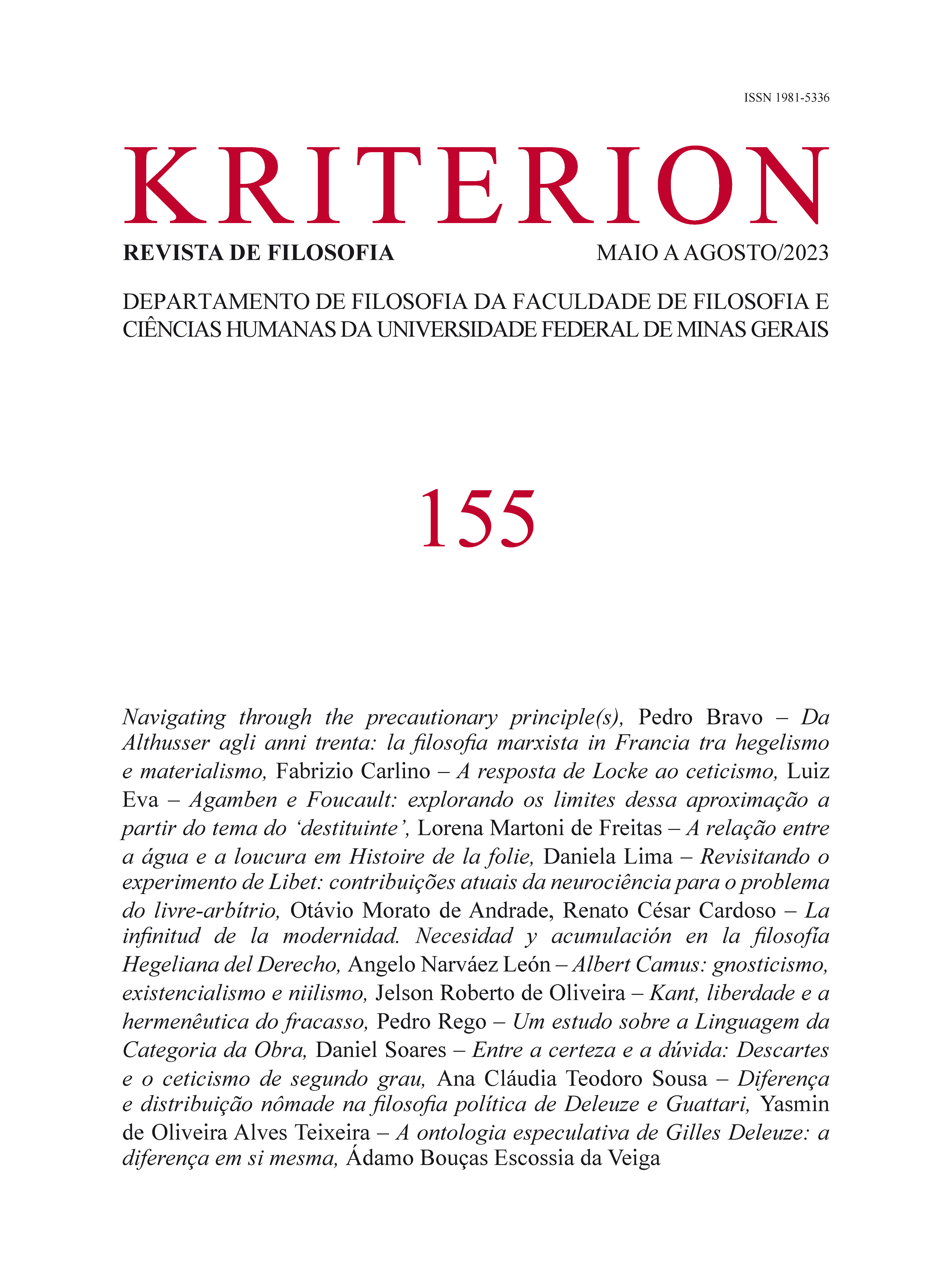AGAMBEN AND FOUCAULT
EXPLORING THE LIMITS OF THIS PROXIMITY UNDER THE PERSPECTIVE OF THE ‘DESTITUENT’ THEME
Keywords:
Giorgio Agamben, Michel Foucault, Destituent, Power, Potency, EthicsAbstract
The work of Giorgio Agamben is punctuated by constant
references to Michel Foucault’s work, so that the latter appears as an important theoretical framework for the former. However, an effort to bring the two authors together proves to be quite problematic as it is perceived that the Italian philosopher operates certain methodological and conceptual categories fundamental to Foucauldian thought in a radically different way from the French philosopher. Such incompatibility is presented with greater clarity when we propose to explore the theme of the destituent in Agamben’s work, from which ontology, politics and ethics intersect, revealing the differences between the two philosophers. Thus, in order to expose the limits of this approximation, it will first be explored the methodological distinctions between the two authors
in their approach of the problem of ‘power’, as well as the way in which the concept is formulated in the work of each of them. Next, the general lines of the agambenian ‘modal ontology’ and the ‘ethics of inoperability’ will be presented
in order to conclusively explain the divergence between the ethical solutions proposed by Foucault and Agamben in their later works.
References
AGAMBEN, G. “Ideia do poder”. In: Ideia de prosa. Trad. João Barrento. Belo Horizonte: Autêntica, 1987. pp. 61-62.
______. “Ideia de prosa”. Trad. João Barrento. Belo Horizonte: Autêntica, 1987.
______. “A potência do pensamento”. Trad. Carolina Pizzolo Torquato. Revista do Departamento de Psicologia, Vol. 18, Nr. 1, 2006, pp. 11-28.
______. “Homo sacer: o poder soberano e a vida nua”. Trad. Henrique Burigo. Belo Horizonte: Ed. UFMG, 2007.
______. “O que é um dispositivo?” In: O que é o contemporâneo e outros ensaios. Trad. Vinícius Nicastro Honesko, Chapecó: Argos, 2009a. pp. 25-54.
______. “O que é o contemporâneo e outros ensaios”. Trad. Vinícius Nicastro Honesko. Chapecó: Argos, 2009b.
______. “Arqueología filosófica”. In: Signatura rerum. Sobre el método. Trad. Flavia Costa e Mercedes Ruvituso. Barcelona: Editorial Anagrama, 2010a. pp. 109-150.
______. “Signatura rerum. Sobre el método”. Trad. Flavia Costa e Mercedes Ruvituso. Barcelona: Editorial Anagrama, 2010b.
______. “O reino e a glória”. Trad. Selvino J. Assmann. São Paulo: Boitempo, 2011.
______. “Por uma teoria do poder destituinte”. 2014. Disponível em: https://5dias.
wordpress.com/2014/02/11/por-uma-teoria-do-poder-destituinte-de-giorgio-agamben/(Acessado em 05 de fevereiro de 2022).
______. “Notas sobre a política”. In: Meios sem fim. Notas sobre a política. Trad. Davi Pessoa, Belo Horizonte: Autêntica, 2015a. pp. 53-56.
______. “Meios sem fim. Notas sobre a política”. Trad. Davi Pessoa. Belo Horizonte: Autêntica, 2015b.
______. “O uso dos corpos - Homo sacer, IV. 2”. Trad. Slevino J. Assmann. São Paulo: Boitempo, 2017.
BENJAMIN, W. “Para uma crítica da violência”. In: Escritos sobre mito e linguagem (1915-1921). Trad. Susana Kampff Lages e Ernani Chaves. São Paulo: Editora 34, 2011a. pp. 121-156.
______. “Escritos sobre mito e linguagem (1915-1921)”. Trad. Susana Kampff Lages e Ernani Chaves. São Paulo: Editora 34, 2011b.
COLLADO, F. G., MATOS, A. S. M. C. “Más allá e la biopolítica: biopotencia, bioarztquía, bioemergencia”. Girona: Documenta Universitaria, 2020.
DREYFUS, H., RABINOW, P. “Michel Foucault: uma trajetória filosófica para além do estruturalismo e da hermenêutica”. Trad. Vera Porto Carrero. Rio de Janeiro: Forense Universitária, 1995.
FOUCAULT, M. “História da sexualidade: a vontade de saber”. Trad. Maria Thereza da Costa Alburqueque e J. A. Guilhon Albuquerque. 13a ed. Rio de Janeiro: Graal, 1999.
______. “Dits et Écrits I, 1954-1975”. Paris: Quarto Gallimard, 2001.
______. “Em defesa da sociedade. Curso no Collège de France (1975-1976)”. Trad. Maria Ermantina Galvão. São Paulo: Martins Fontes, 2005.
______. “Nascimento da biopolítica”. Trad. Eduardo Brandão. São Paulo: Martins Fontes, 2008a.
______. “Segurança, território, população. Curso dado no Collège de France (1977-1978)”. Trad. Eduardo Brandão. São Paulo: Martins Fontes, 2008b.
______. “Qu’est-ce que la critique”. In: “Qu’est-ce que la critique?” suivi de “La culture de soi”. Paris: Vrin, 2015a. pp. 33-80.
______. “‘Qu’est-ce que la critique?’ suivi de ‘La culture de soi’”. Paris: Vrin, 2015b.
______. “Subjectivity and Truth”. In: About the beginning of the hermeneutics of the
self. Lectures at Dartmouth College, 1980. Trad. Graham Burchell. Chicago-London: The University of Chicago Press, 2016a. pp. 19-51.
______. “About the beginning of the hermeneutics of the self. Lectures at Dartmouth College, 1980”. Trad. Graham Burchell. Chicago-London: The University of Chicago Press, 2016b.
______. “Dits et Écrits II, 1976-1988”. Paris: Quarto Gallimard, 2017.
GOMES, A. S. T., MATOS, A. S. M. C. “A proposta de uma forma-de-vida anárquica na obra de Giorgio Agamben: uso inoperoso e não constituinte do poder”. Revista da Faculdade de Direito UFMG, Nr. 71, pp. 47-68, 2017.
HEIDEGGER, M. (1953). “A questão da técnica”. Trad. Marco Aurélio Werle. Scientiae Studia, Vol. 5, Nr. 3, 2007, pp. 375-98.
Downloads
Published
Issue
Section
License
Copyright (c) 2023 Revista Kriterion

This work is licensed under a Creative Commons Attribution 4.0 International License.










